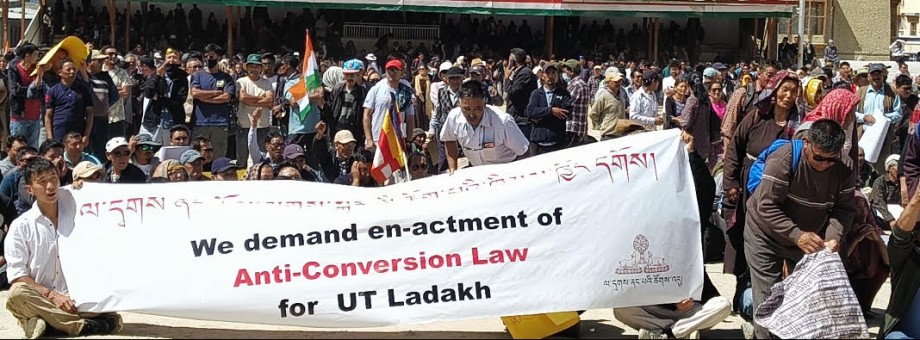Interfaith marriage controversy rocks Ladakh, sparks community outcry LBA demands Anti-Conversion law in Ladakh

The issue of interfaith marriages continues to be a sensitive and contentious topic in Ladakh, with recent events reigniting communal tensions in the region. On September 6, the Ladakh Buddhist Association (LBA) organised a protest rally in Leh in response to the conversion and marriage of a Buddhist girl, who wedded a Muslim man, in 2011 reportedly. While the marriage itself is a decade-old, the tensions surrounding it are more recent.
The protest saw businesses shutting down as demonstrators voiced their concerns over the alleged forced conversions and called for the implementation of an anti-conversion law in Ladakh.
LBA reiterated a three-point agreement signed between the Muslim and Buddhist communities of Leh on November 30, 1992. The agreement’s first point states, “The two communities shall deter and discourage inter-community marriage, which was found to be the single major factor causing the breakdown in the Buddhist-Muslim relationship. In consequence, it shall be incumbent on both communities to restore the individual/ boy or a girl/ to his/ her faith in the event of the inter-community marriage entered into. In so doing the willingness or otherwise of the girl or a boy or legality of such action shall not be cited as an excuse for refusal to respect this agreement by either of the community.”
According to the LBA, the Muslim community has failed to uphold this agreement, citing instances of conversion, particularly among women, driven by monetary allurement, misrepresentation, and fraudulent tactics.
Addressing the rally, President, LBA, Thupstan Chhewang stressed the need for an anti-conversion law in Ladakh and expressed disappointment in the lack of support from the girl’s family.
Anti-conversion law are set of judicial rules that prevent or prohibit the conversion from one religion to another. These laws are meant to prevent forced religious conversion of individuals and to prevent religious groups from recruiting members from other religions. The law was enacted by Uttar Pradesh, Madhya Pradesh, Gujarat, Himachal Pradesh, Uttarakhand, Karnataka, Chhattisgarh, Haryana and Jharkhand.
President, LBA, Women Wing, Yangchen Dolma declared their determination to address the issue, stating, “We won’t tolerate this anymore. These people always betray us and act behind our backs. We have been tirelessly advocating for an anti-conversion law, but both the previous and current Lieutenant Governors of Ladakh have ignored us. However, we’re still fighting and won’t give up.”
She urged parents to educate their children about the matter. She emphasized that without action, the problem would persist.
President LBA, Youth wing, Rigzen Dorjey said, “We shouldn’t ignore the conversion matters and should investigate them thoroughly. It's discouraging to see that even the girl’s family is least bothered and is not in support of getting their girl back. LBA alone cannot effect change without support.”
Narrating the whole incident, Rigzen Dorjey said that they reached out to President, Anjuman Moin-ul Islam, Dr. Abdul Qayum to inquire about the marriage and the possibility of getting the girl back.
“Unfortunately, we haven’t received any response from their side. We won’t sit quietly; we will definitely take action and not ignore this matter”, he added.
In response to the allegations, Anjuman Moin ul Islam headed by President Dr. Abdul Qayum convened a press conference at their office on September 7.
Dr. Qayum said, “In recent protests, people were alleging Muslims and Anjuman Moin-ul-Islam for their involvement in forced conversions, but I want to clarify that this is not true. We consistently discouraged inter-faith marriages and have not conspired to change individual's faith. It is not just Buddhists who are getting converted; there are also many Muslims who have converted to Buddhism. We believe that religion is a personal matter and won’t force anyone to follow a religion which they don’t prefer.”
He expressed regret over the use of terms like ‘Love Jihad’ during protests and emphasised that such accusations should be avoided to maintain peace in Ladakh.
However, a video of the girl herself went viral on social media groups claiming that her marriage is voluntary and not coerced. Citing the example of other past interfaith marriages that happened in Ladakh, she accused certain political parties and individuals of politicizing the issue for their vested interest.
Furthermore, Nazir Ahmed, the father of the boy and Vice-President BJP Ladakh unit, was expelled from his position and had his primary membership revoked for his alleged involvement in the elopement of the Buddhist girl with his son.
As tensions persist, Ladakh remains at a crossroads, grappling with the complex issue of interfaith marriages and conversions, as well as the need for dialogue and understanding between its diverse communities.





